
Hindu Dharma has advised sanskars to be performed during the sixteen principal events of life, so as to move closer to God. The most important of them being the ‘Vivahasanskar (Marriage sanskar)’! The true objective of a marriage is that two individuals seek the blessings of God to lead a compatible and happy married life! For this, it is absolutely essential to perform the ritual of marriage strictly as per the scriptures. This article explains the importance of performing marriage as per scriptures and not consider it as a social function.
1. A social marriage function should be performed outside the temple and a religious marriage function inside a temple!
In the earlier times, Hindus would conduct marriage functions religiously. It was a practice to perform marriage in a temple so that the bride and the groom benefit from the Chaitanya (Divine consciousness) in the temple. Today, however, Hindus feel that a marriage function means fun and frolic. Therefore, when these are in progress the guests chat among themselves, music is played in the background and intermittently a band is played. Due to these mixed sounds, the sattvikta (Purity) generated by performing religious rituals decreases instead of being retained. Crackers are burst after the bride and the groom garland each other, and this too reduces the sattvikta. If a marriage function (that is looked upon more as a social event than a religious ceremony) is performed in a temple hall, none will benefit from the Chaitanya in the temple; on the contrary, Raja-Tama will spread inside the temple. Hence, Hindus should maintain the sanctity of the temple while performing a marriage ceremony, and if it is to be performed as a social event then perform it outside the temple!
2. Never ignore the priest’s suggestion to follow the scriptures, and perform all marriage rituals only as per scriptures!
All Hindus who are aware about the need to be active for the cause of Dharma (Righteousness), to ponder over this issue. For the marriage rituals the bride and the groom wear western clothes. When the priest suggested that the groom should wear a dhoti with uparne and the bride a nine-yard sari, one of the relatives remarked, “Does Sanatan Sanstha recommend that the bride wear a nine-yard sari during marriage rituals?”, when in reality this is a norm given in the scriptures. Sanatan Sanstha only explains the science underlying this ritual. When the priest advises the groom to wear dhoti–uparne and the bride to wear a nine-yard sari, some relatives say, ‘Leave it for us to decide. Don’t think about all such things. Do everything as per the present times’. Yet, the same people insist on following all the other local customs pertaining to marriage and when advised to perform rituals as per scriptures they do not accept it. It is important that people keep in mind that the welfare of the bride and the groom lies in performing marriage rituals as per the guidelines mentioned in the scriptures.
3. View a marriage ceremony as ‘a religious sanskar’ and not as a mere ‘function’!
A. Instead of playing a band or tamasik or melancholic film songs at the marriage venue, play shehanai music or sattvik (Sattva-predominant) bhajans (Devotional songs)!
B. Do not burst crackers either during the marriage or in the marriage procession! Crackers cause noise and air pollution and make the environment Raja-Tama predominant, thus causing accumulation of demoniacal energies at the venue and distress to all those present there.
4. Avoid serving tamasik (Tama-predominant) western food during marriage; instead, serve sattvik Bharatiya food!
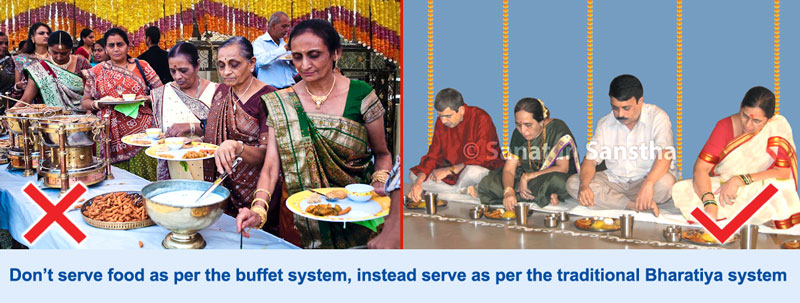
A. Do not include excessively oily, pungent, spicy items or bread and artificially flavoured cold drinks; these are tamasik in nature. Instead, include sattvik items such as lentil-rice with ghee, green salad, laddoos etc.
B. Do not serve food as per the buffet system of the western culture; instead serve as per the traditional Bharatiya system.
C. Food is a ‘Divine Principle’ in entirety. Therefore, avoid wastage of food!
5. Do not splurge money on a marriage; instead, use it for the cause of the Dharma!
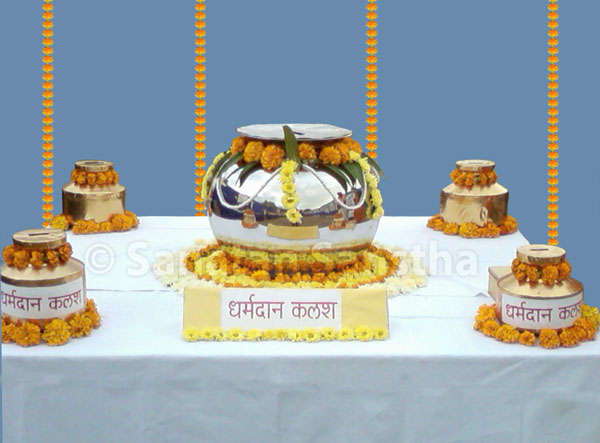
Earlier a marriage was viewed as ‘a pure sanskar’. However, with passage of time the attitude of the society of viewing marriage is undergoing changes. Today, instead of religious rituals, more importance is given to conserving its social importance. From selection of exorbitantly priced marriage halls tots lighting, a lot of money is spent. At times, religious rituals in the marriage are wound up quickly, but honoring of relatives, marriage procession, marriage reception etc. are all events carried out with pomp and splendour. The money (wasteful expenditure) on these events can be saved for future use of the bride and the groom. If used for the upliftment of the Nation or Dharma (which is going through a crisis), it will give one spiritual benefits.
Reference : Sanatan Sanstha’s Holy text ‘Marriage sanskar’

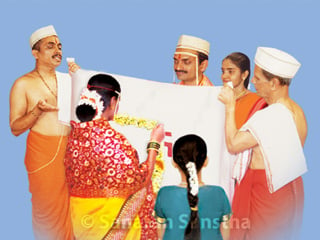
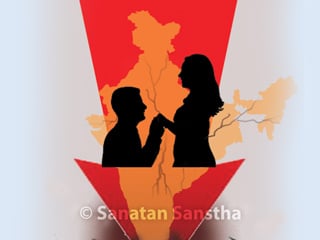 Danger of collapse of the family system due to the resulting immorality !
Danger of collapse of the family system due to the resulting immorality !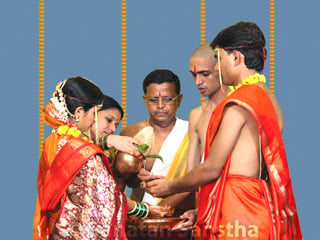 Kanyadan
Kanyadan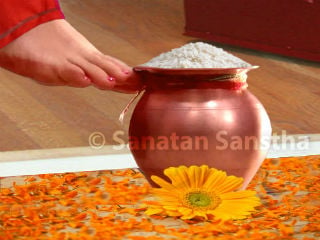 Vadhu Griha-pravesh and other rituals which are performed after the Marriage
Vadhu Griha-pravesh and other rituals which are performed after the Marriage